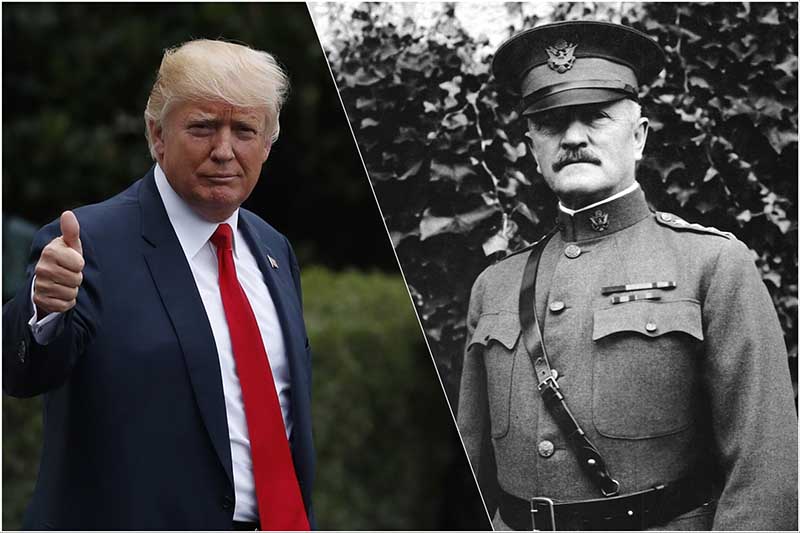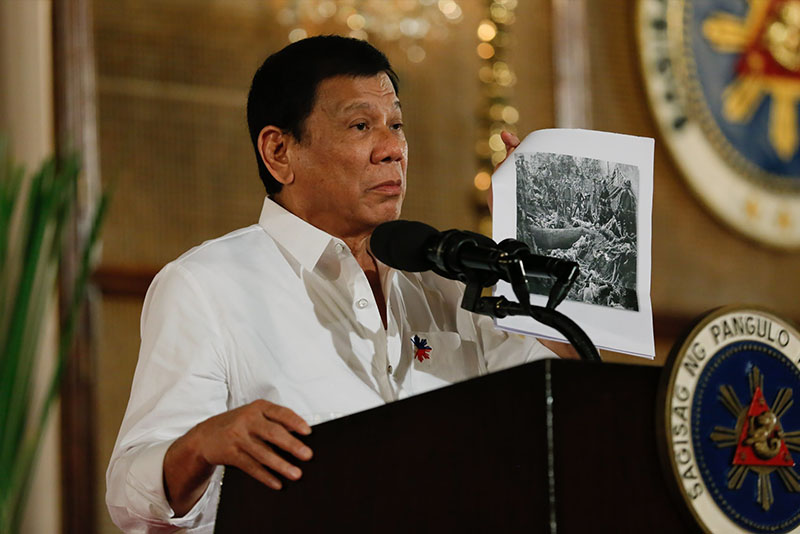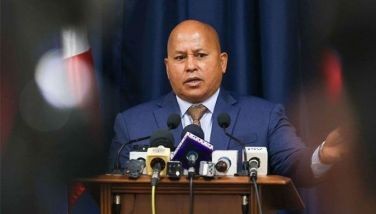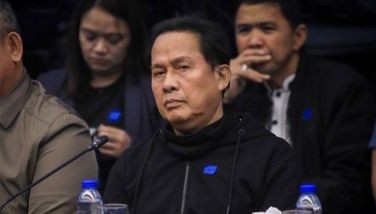Trump makes false claim about Mindanao history

President Donald Trump gives the thumbs-up as he walks to Marine One across the South Lawn of the White House in Washington, Monday, Aug. 14, 2017, for the short trip to Andrews Air Force Base en route to New York. On Friday, Trump tweeted a false historical claim about US Army Gen. John Pershing, who was installed governor of Moro areas during the American occupation in the Philippines. AP/Carolyn Kaster
MANILA, Philippines (Update 3, 11:11 a.m.) — Under fire for his supposedly racially charged behavior, American President Donald Trump set another round of Twitter firestorm on Friday (Manila time) calling Moros in Mindanao during the American occupation "terrorists."
"Study what General Pershing of the United States did to terrorists when caught. There was no more Radical Islamic Terror for 35 Years!" Trump tweeted, apparently reviving a debunked legend about a United States Army Gen. John Joseph "Black Jack" Pershing in subduing Moro rebels a century ago in the aftermath of the Philippine-American War.
Pershing, according to the historical myth, curbed the rebellion in the Philippines' south by shooting the rebels with bullets dipped in pig blood.
Americans faced Filipino armed opposition from 1899 to 1902 as they tried to occupy the archipelago following centuries of Spanish rule.
Pershing was installed governor of Moro areas in the south, but his four-year tenure starting 1909 was beset by insurgencies as the general tried to disarm the Muslim locals. Around 1,200 American troops led by Pershing faced a fierce resistance of 800 Moros in Jolo in the Second Battle of Bud Dajo.
This was not the first time that Trump referred to the urban legend about pig's blood used to defeat the Muslim inhabitants of the islands.
In a speech in North Charleston in 2016, Trump claimed that Pershing and Americans in the Philippines' south had a "tremendous problem with terrorism."
"(Pershing) took 50 bullets, and he dipped them in pig's blood. And he had his men load his rifles and he lined up the 50 people, and they shot 49 of those people. And the 50th person, he said, 'You go back to your people and you tell them what happened.' And for 25 years, there wasn't a problem," he said.
Historians have long debunked the story, saying it was uncharacteristic of Pershing to do so and there has been no evidence to confirm it.
Trump's latest historically inaccurate comment about the Philippines was a followup to another tweet condemning violence in Barcelona, where more than a dozen people were killed when a van peered onto a sidewalk and sped down a busy pedestrian zone in what authorities called a terror attack.
The tweet referring to the rebellion in Mindanao following a string of comments Trump made defending Confederate figures, bemoaning rising efforts to remove them as an attack on America's "history and culture."
Trump has berated his critics who, with increasingly sharper language, have denounced his initially slow and then ultimately combative comments on the racial violence at a white supremacist rally last weekend in Charlottesville, Virginia.
Striking a chord
The American leader's latest remark drawing attention to the history of Moros in the Philippines' south could bolster the President Rodrigo Duterte's controversial views about the country's former colonizer.
A decade after the Second World War, the United States became the Philippines' mutual defense ally. Bilateral relations reached a new high under the watch of Duterte's successor, Benigno Aquino III, before losing momentum under the testy Duterte, whose animosity toward the US is well known.
Often in delivering his public remarks, Duterte would take a swipe at the US and remind of its historical atrocities. He would praise China as often in pursuing a foreign policy pivot that has affected geopolitical dynamics in the region.
In September last year, in an effort to appeal to nationalist sentiments, Duterte showed a photo from The National Archive of the Bud Dajo massacre in 1906 to lament the abusive American rule a century ago.

President Rodrigo Duterte shows to the audience a picture of the Bud Dajo massacre at the 2016 Metrobank Foundation's Outstanding Filipinos awarding ceremony in Malacañan's Rizal Hall on Sept. 12, 2016. PPD/Toto Lozano
The image shows soldiers posing for the camera at a mass grave of among the 1,000 Moros killed by the force led by Major General Leonard Wood at Bud Dajo, a dormant volcano in Jolo. In showing the photo, Duterte said he wanted US forces out of his country's south and blamed America for the restiveness of Muslim militants in the region.
Losing Republicans' support?
Trump's unpredictable, defiant and, critics claim, racially provocative behavior has clearly begun to wear on his Republican allies.
Tennessee Sen. Bob Corker, whom Trump considered for a Cabinet post, declared Thursday that "the president has not yet been able to demonstrate the stability nor some of the competence that he needs to" in dealing with crises. And Sen. Dan Sullivan of Alaska tweeted, "Anything less than complete & unambiguous condemnation of white supremacists, neo-Nazis and the KKK by the @POTUS is unacceptable. Period."
Sen. Tim Scott of South Carolina said Trump's "moral authority is compromised."
Trump, who is known to try to change the focus of news coverage with an attention-grabbing declaration, sought to shift Thursday from the white supremacists to the future of statues.
"You can't change history, but you can learn from it," he tweeted. "Robert E. Lee. Stonewall Jackson — who's next, Washington, Jefferson? So foolish. ...
"Also the beauty that is being taken out of our cities, towns and parks will be greatly missed and never able to be comparably replaced!"
"Sad to see the history and culture of our great country being ripped apart with the removal of our beautiful statues and monuments," he tweeted. — Camille Diola with reports from the Associated Press (New Jersey)
- Latest
- Trending

































